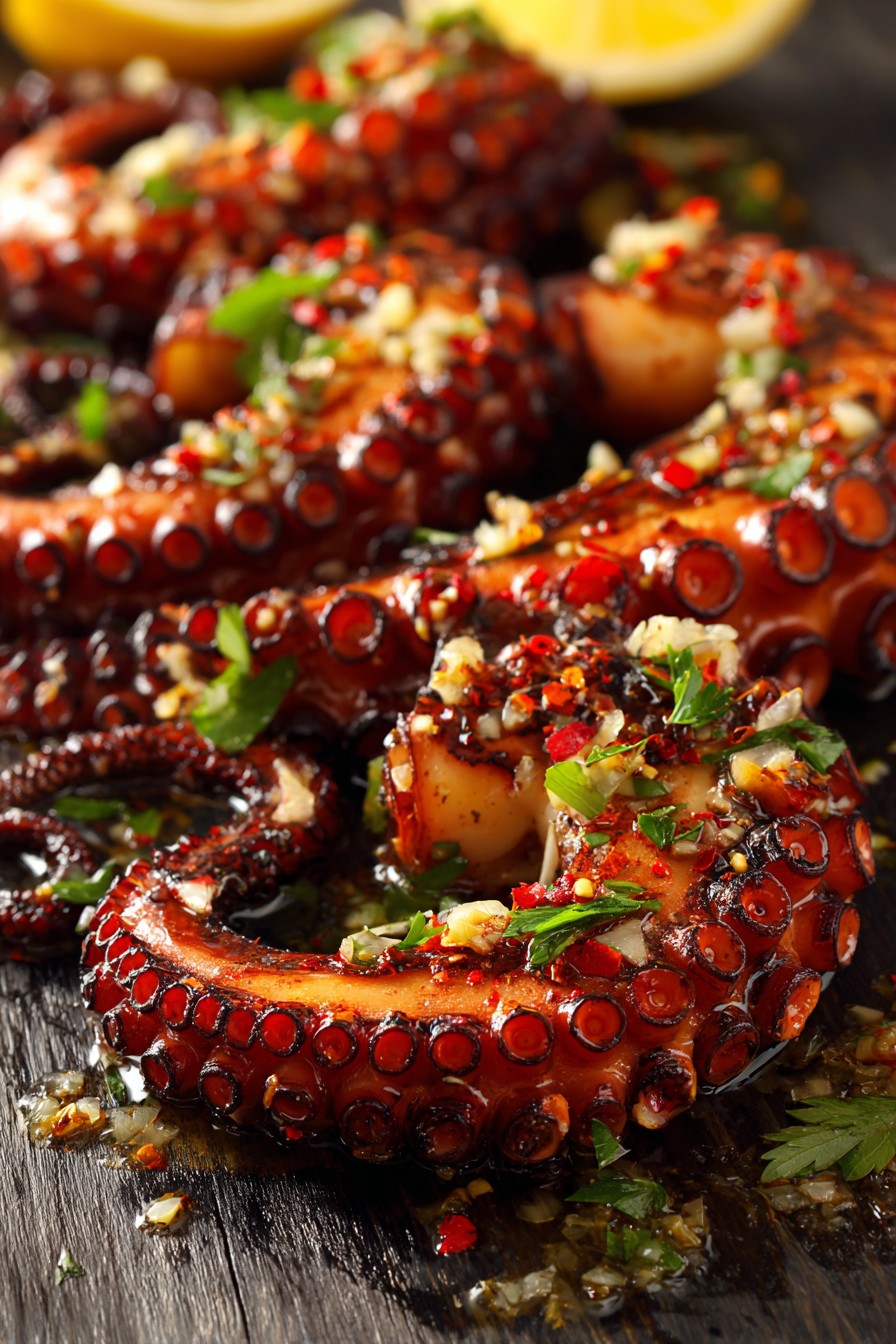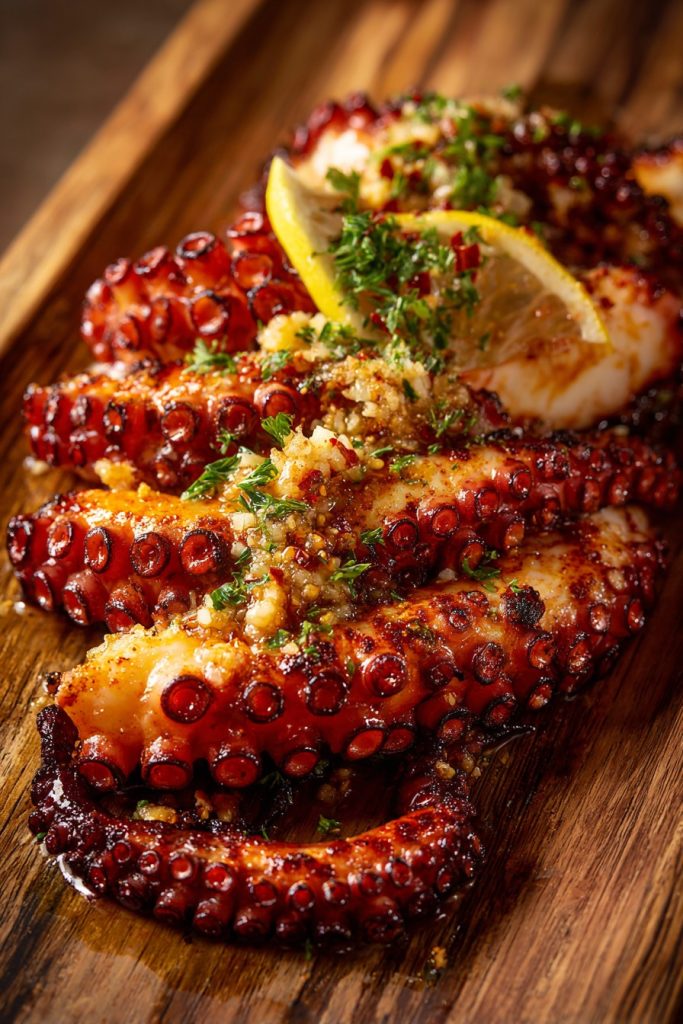Getting dinner on the table shouldn’t feel like a culinary obstacle course, especially when dealing with intimidating ingredients like octopus. Gone are the days of rubbery, chewy seafood disasters that leave everyone disappointed and you stressed. This recipe transforms what seems complicated into a straightforward process that delivers restaurant-quality results with minimal kitchen time and cleanup, perfect for busy weeknights when you want something special without the fuss.
Why This Recipe Works
- The combination of simmering then grilling ensures perfectly tender octopus every time, eliminating the guesswork and rubbery texture that often plagues home cooks. This two-step method breaks down the tough connective tissues during simmering, then creates that beautiful char and smoky flavor during grilling.
- Using frozen pre-cleaned octopus saves significant prep time and eliminates the messy cleaning process, making this intimidating seafood accessible for busy families. Most fish counters now carry frozen octopus that’s already been cleaned and prepared, cutting your hands-on time in half.
- The simple Mediterranean-inspired marinade requires just pantry staples but delivers complex flavors that make this dish feel gourmet without expensive ingredients. Lemon, garlic, and herbs come together in minutes but taste like you spent hours developing the flavor profile.
- Minimal equipment and easy cleanup mean you’re not facing a mountain of dishes afterward – just one pot for simmering and the grill for cooking. This streamlined approach respects your time and energy while still delivering impressive results.
- Flexible serving options work for everything from quick family dinners to entertaining guests, adapting to your schedule without additional stress. Serve it warm right off the grill or chilled for meal prep – both ways are delicious.
Ingredients
- 2 pounds frozen pre-cleaned octopus, thawed
- 3 tablespoons olive oil, divided
- 4 cloves garlic, minced
- 1 lemon, juiced and zested
- 1 teaspoon dried oregano
- 1/2 teaspoon red pepper flakes
- 1 teaspoon kosher salt
- 1/2 teaspoon black pepper
- 2 tablespoons fresh parsley, chopped
- 1 bay leaf
- 4 cups water
Equipment Needed
- Large pot with lid
- Grill (gas or charcoal)
- Tongs
- Mixing bowl
- Knife and cutting board
- Measuring spoons
Instructions

Prepare and Simmer the Octopus
Start by placing your thawed octopus in a large pot along with the bay leaf and 4 cups of water. Bring this to a boil over high heat, then immediately reduce to a gentle simmer and cover with the lid. Let it cook for 30-45 minutes until the octopus becomes tender when pierced with a fork – you’re looking for it to yield easily but not fall apart. The simmering liquid should bubble gently rather than boil vigorously to prevent toughening. While it cooks, you can prep your marinade and set the table, making efficient use of this hands-off time. Test for doneness by inserting a fork into the thickest part of a tentacle; it should slide in with minimal resistance. Pro tip: Don’t skip the simmering step even if you’re tempted to grill directly – this is what ensures tender, not rubbery, results every single time.
Create the Flavorful Marinade
While the octopus simmers, combine 2 tablespoons of olive oil with the minced garlic, lemon juice and zest, dried oregano, red pepper flakes, kosher salt, and black pepper in a medium mixing bowl. Whisk everything together thoroughly until the salt dissolves and the oil emulsifies slightly with the lemon juice. The acid from the lemon will help tenderize the octopus further while the garlic and herbs infuse it with Mediterranean flavors. Taste the marinade and adjust seasoning if needed – remember the octopus itself is fairly neutral, so this is where most of your flavor comes from. Let the marinade sit at room temperature while the octopus finishes cooking to allow the flavors to meld together. This resting time deepens the flavor profile without any additional work from you.
Drain and Marinate the Cooked Octopus
Once the octopus is tender, carefully remove it from the pot using tongs and place it on a cutting board to cool slightly – about 5-10 minutes until it’s comfortable to handle. Discard the cooking liquid and bay leaf, then pat the octopus dry with paper towels to help the marinade adhere better. Cut the octopus into manageable pieces, separating the tentacles from the head if present, and place everything in the bowl with your prepared marinade. Toss thoroughly to coat every surface, making sure the garlic and herbs are evenly distributed. Let it marinate for at least 15 minutes at room temperature – this short marinating time is sufficient because the octopus is already cooked and just needs to absorb the flavors. Pro tip: Patting the octopus dry before marinating helps the flavors stick better and promotes better browning on the grill.
Grill to Perfection
Preheat your grill to medium-high heat (about 400-450°F) and lightly oil the grates to prevent sticking. Arrange the marinated octopus pieces on the hot grill, making sure not to overcrowd them – you want space between pieces for proper browning. Grill for 2-3 minutes per side, using tongs to flip, until you achieve nice char marks and the edges become slightly crispy. The octopus is already cooked through from simmering, so you’re just looking for that beautiful grill marks and smoky flavor. Watch carefully as the sugar in the marinade can cause burning if left too long – the perfect doneness shows deep grill marks without blackened spots. The internal temperature should reach 145°F if you’re checking with a thermometer, but visual cues are more reliable here.
Finish and Serve Immediately
Transfer the grilled octopus to a serving platter and drizzle with the remaining 1 tablespoon of olive oil. Sprinkle with the chopped fresh parsley for a bright, fresh finish that contrasts beautifully with the smoky grilled flavor. Serve immediately while hot – the texture is at its best right off the grill when the outside is slightly crispy and the inside remains tender. This dish pairs wonderfully with simple sides like lemon rice, roasted vegetables, or a crisp green salad that don’t require much additional prep time. Pro tip: Let the octopus rest for just 2-3 minutes after grilling before serving – this allows the juices to redistribute without losing that wonderful heat that makes grilled seafood so satisfying.
Tips and Tricks
If you want to get ahead on dinner prep, you can simmer the octopus up to two days in advance and store it in the refrigerator in an airtight container. When ready to serve, simply bring it to room temperature, marinate, and grill – this cuts your active cooking time to just 15 minutes on busy nights. For even more tender results, some cooks add a wine cork to the simmering water, though the science behind this is debated, many swear by the enzymatic action that helps break down proteins. When grilling, make sure your grates are very clean and well-oiled to prevent sticking – octopus can be delicate after simmering. If you don’t have a grill or weather isn’t cooperating, you can achieve similar results using a grill pan on your stovetop or even broiling in the oven on high for 3-4 minutes per side. For meal prep purposes, grilled octopus keeps well in the refrigerator for up to 3 days and makes excellent salads or pasta additions later in the week. If you’re dealing with particularly large tentacles, you might want to score them lightly with a knife before grilling to help the marinade penetrate deeper and ensure even cooking. Always buy from reputable seafood counters and look for octopus that smells fresh and oceanic rather than fishy – frozen is often your best bet for consistent quality. When testing for doneness during simmering, remember that octopus will continue to cook slightly from residual heat, so remove it just before it reaches your desired tenderness. For families with varying spice preferences, you can adjust the red pepper flakes or serve them on the side rather than in the marinade. If you end up with leftover grilled octopus, it makes fantastic next-day tacos or salad toppers – just chop it up and enjoy in new ways.
Recipe Variations
- For a Spanish twist, add 1 teaspoon smoked paprika to the marinade and serve with roasted potatoes and alioli sauce. The smokiness complements the grilled flavor beautifully while the creamy garlic sauce adds richness that balances the lean protein. This variation turns your octopus into a tapas-style dish that feels fancy but comes together just as easily as the original.
- Create an Asian-inspired version by substituting the oregano with 1 tablespoon grated fresh ginger and replacing the lemon juice with 2 tablespoons rice vinegar. Add 1 tablespoon soy sauce to the marinade and garnish with sliced scallions and sesame seeds. The ginger and soy create a completely different flavor profile that works wonderfully for changing up your weekly menu without additional complexity.
- Make it a complete meal by tossing the grilled octopus with cooked pasta, cherry tomatoes, and extra olive oil for a quick seafood pasta dish. The octopus adds protein to carb-heavy pasta night while feeling special enough for weekends. Use the residual marinade as part of your pasta sauce to maximize flavor without extra ingredients.
- For a chilled salad option, grill the octopus as directed then refrigerate and serve over mixed greens with cucumber, red onion, and kalamata olives. Dress with a simple vinaigrette made from the remaining marinade thinned with a bit more lemon juice. This no-cook serving method is perfect for hot summer days when you want something light but satisfying.
- Transform it into appetizer portions by cutting the tentacles into smaller pieces before grilling and serving with toothpicks and lemon wedges. This party-friendly approach lets you stretch 2 pounds of octopus to feed more people while maintaining the impressive presentation that makes guests think you spent hours in the kitchen.
Frequently Asked Questions
Can I use fresh octopus instead of frozen?
Absolutely, though frozen often works better for home cooks because it’s typically already cleaned and tenderized during the freezing process. If using fresh octopus, you’ll need to clean it thoroughly by removing the beak, eyes, and innards, which adds about 15 minutes to your prep time. The cooking method remains exactly the same – simmer until tender then grill. Many seafood experts actually prefer frozen for octopus because the freezing process helps break down the tough fibers, resulting in more consistent tenderness. Either way, make sure whatever you buy smells fresh and clean rather than overly fishy.
How do I know when the octopus is properly cooked during simmering?
The fork test is your most reliable indicator – when a fork inserts easily into the thickest part of a tentacle with minimal resistance, it’s ready. The texture should be tender but still have some bite, similar to well-cooked pasta al dente. Avoid overcooking, which can make it mushy rather than tender. The simmering time typically ranges from 30-45 minutes depending on the size of your octopus, with larger specimens taking longer. You’re looking for the octopus to turn a uniform pinkish color and the skin to become slightly gelatinous but not falling apart.
What if I don’t have a grill available?
No problem – you can achieve excellent results using a grill pan on your stovetop or even broiling in the oven. For stovetop, heat a grill pan over medium-high heat until very hot, then cook the octopus for 2-3 minutes per side until nicely charred. For broiling, place the marinated octopus on a baking sheet lined with foil and broil 4-6 inches from the heat source for 3-4 minutes per side. Both methods will give you that desirable caramelization and slight crispiness that makes grilled octopus so appealing, just without the smoky flavor.
Is octopus healthy for regular family meals?
Yes, octopus is surprisingly nutritious – it’s lean protein that’s low in fat and calories but high in essential nutrients like iron, vitamin B12, and selenium. A 3-ounce serving provides about 25 grams of protein with only 140 calories, making it an excellent choice for health-conscious families. It’s also a sustainable seafood option when sourced responsibly. The simple preparation in this recipe keeps it healthy by using minimal oil and focusing on herbs and citrus for flavor rather than heavy sauces or excessive salt.
Can I prepare this recipe with kids helping in the kitchen?
Definitely, with some age-appropriate tasks assigned. Older children can help measure marinade ingredients and whisk them together, while younger ones can arrange the cooked octopus on the platter and sprinkle parsley. The grilling should always be handled by adults for safety, but kids love watching the transformation and feeling involved in creating something special. Cooking together builds valuable skills and makes mealtime more engaging for picky eaters who might otherwise hesitate to try new foods like octopus.
Summary
This grilled octopus recipe proves that impressive seafood dinners don’t require professional skills or endless hours. With smart shortcuts and clear instructions, you can serve tender, flavorful octopus that will have your family thinking you ordered takeout from a fancy Mediterranean restaurant.
Easy Grilled Octopus
5
servings15
minutes45
minutesIngredients
Instructions
- 1 Simmer octopus with bay leaf in water for 30-45 minutes until tender
- 2 Whisk together 2 tablespoons olive oil, garlic, lemon juice and zest, oregano, red pepper flakes, salt, and pepper
- 3 Drain cooked octopus, pat dry, and toss with marinade for 15 minutes
- 4 Grill marinated octopus at 400-450°F for 2-3 minutes per side until charred
- 5 Drizzle with remaining olive oil, garnish with parsley, and serve immediately



